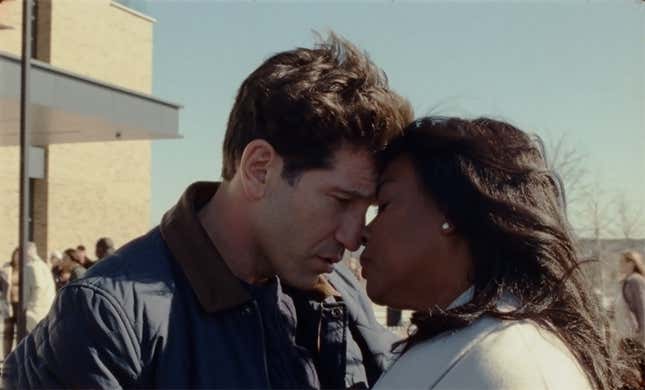
There’s a scene nearly halfway through Origin where the protagonist is advised by her confidant to simplify her new book’s sharp-but-unwieldy premise or risk losing potential readers. It reads like similar feedback given to writer-director Ava DuVernay in her development of this riveting feature, which gives voice to Isabel Wilkerson’s personal and professional struggles while writing her compelling novel Caste: The Origins of Our Discontents. Achieving a breakthrough for the character and audience members alike, the astute filmmaker drills into the dramatic core and lets the film’s magnitude push the picture’s heartrending sentiments to the fore.
Isabel Wilkerson (Aunjanue Ellis-Taylor) is on top of the world when we first meet her, coming off of a successful book tour. She’s won acclaim and respect worldwide as an author and Pulitzer Prize-winning journalist. She has a lovely home in the suburbs. She also has her supportive husband Brett (Jon Bernthal) and caring best friend/cousin Marion (Niecy Nash-Betts). However, her world starts slipping out of her control. As her conscience grapples with transferring her elderly mother into an assisted living facility, she’s dealt an unimaginable blow when Brett suddenly dies. And, while she’s in deep mourning, her mother also perishes due to degrading health.
Grief-stricken, anguished and needing money to survive, Isabel begins percolating on her next book idea. She ruminates on the concept of racism and what that terminology means in our modern era by connecting horrible happenings in current events, kicking off with Trayvon Martin’s attack and murder and crystalizing it further with Heather Heyer’s. She theorizes it’s not racism at the root of these problems, but rather the caste system we’ve inherited. While her editor (Vera Farmiga) doesn’t grasp Isabel’s initial, overly broad pitch, the writer’s journey has already commenced, leading Isabel on a path to world-shattering discoveries dealing with Nazi Germany, the 1930s American South and contemporary Indian society.
Showcasing her visual dexterity, DuVernay admirably experiments with different styles, ranging from straightforward delivery (which has a soft, rich profundity all its own thanks to Matthew J. Lloyd’s supple cinematography) to the more esoterically poetic (visualizing her heroine’s sorrow as Isabel lying on a bed of fallen leaves in a black void). Tucked away in the hushed silence of Marion’s arc, we see diabetes—yet another crisis affecting the Black community —taking hold.
Initially, the documentary-style interviews and re-enactments—vignettes featuring Dalit scholar Dr. Bhimrao Ambedkar (Gaurav J. Pathania), pioneering anthropologists Dr. Allison (Isha Carlos Blaaker) and Elizabeth Davis (Jasmine Cephas Jones), and a Jewish woman (Victoria Pedretti) and her former Nazi sympathizer husband (Finn Wittrock)—prove difficult for the audience to settle into. This mimics the cumbersome, frustrating thought process saddling Isabel. Still, these sequences find their connective rhythms by the midway point. The finale montage, utilizing Arvo Pärt’s “Spiegel Im Spiegel,” has a resounding impact as the beauty in the music is juxtaposed with the ugliness of humanity.
It’s not easy to do what DuVernay’s done with the narrative, turning a nonfiction, informational page-turner into an investigational, biographical drama. While it doesn’t pull off the adaptation quite effortlessly, it finds its footing, balancing on a high wire. Occasionally it employs a heavy hand, like in sequences when Isabel unwittingly hires a curt MAGA-hatted plumber (Nick Offerman), when she’s placed in a combative dinner conversation with an abrasive German scholar (Connie Nielsen), and in a flashback when she asks Brett to deal with a disrespectful pest control provider. Yet these segments ingeniously pull double duty, showcasing Isabel’s innate ability to handle sticky situations with grace and fortitude. She comes out the winner in each of these character-defining moments—respectively, with a discount, a renewed goal and new love.
Ellis-Taylor gives a virtuoso performance full of restrained pathos and gravitas. She effectively channels every ounce of joy and pain, elevating the material and morphing any maudlin melodrama into palpable poignancy. Nash’s work is complementary as the audience’s avatar, and brings limited levity to the heavy proceedings. Audra McDonald, playing Isabel’s friend Miss Hale, practically steals the show in her brief screen time, delivering an incredibly moving monologue as a static camera holds on her face.
By film’s end, it’s clear Wilkerson and DuVernay have both tapped into powerful revelations on how to better our world and reckon with generational trauma. Whether those who desperately need to hear this resonant, resourceful message will open themselves up to listening remains to be seen. But for those who choose to take this riveting journey of discovery, they’ll find this picture gets them to a place of inspiring enlightenment and keeps them in that mindset far beyond the end credits scroll.
Origin opens in theaters New York and Los Angeles on December 8 and expands to select cities on January 19